This blog is Archived. Please visit https://thinkswiss.org/ for up-to-date information!
Don't wanna be here? Send us removal request.
Text
Check out our new website!
ThinkSwiss has a new website!
Make sure to check it out at ThinkSwiss.org!
From now on up to date information and blogposts will be shared on the new website.
The ThinkSwiss blog is now officially archived.
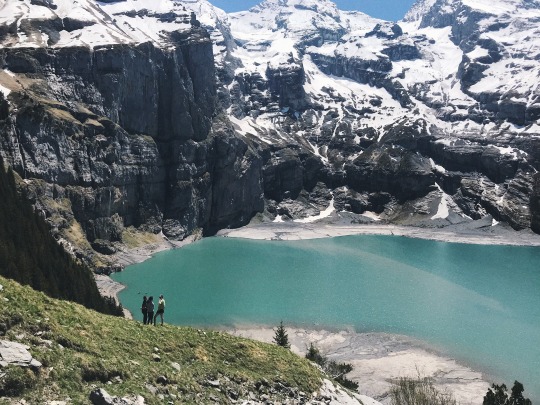
Apply now for the ThinkSwiss Research Scholarship! Deadline: January 15
1 note
·
View note
Text
Apply Now
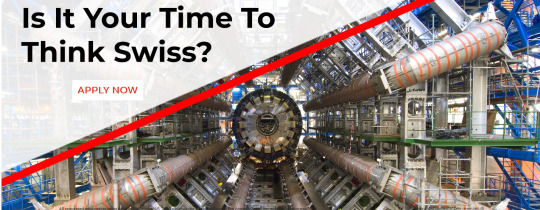
Call for 2020 Applications!
Are you interest in doing research in Switzerland in 2020?
Then apply now for the ThinkSwiss Research Scholarship!
Here is all you need to know: Click!
Make sure to send us your complete application by January 15, 2020. Good Luck!
____________________________________
Download our FaQ and Application Form
2 notes
·
View notes
Text
Summer School “Confronting Climate Change – from Science to Policy”
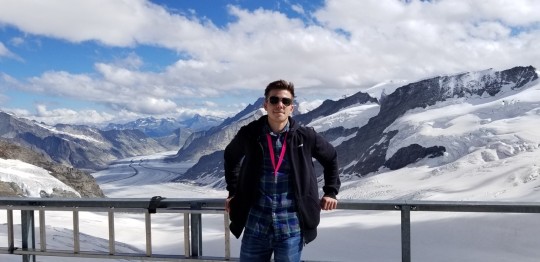
This summer school at the University of Bern has easily been some of the best two weeks of my life. The combination of keynote lectures from leaders in their respective fields, guided work on a project relevant to my field of study, and a climate policy negotiation simulation allowed me to develop a far more well-rounded understanding of current climate change research. Coming from a natural sciences background, I had some prior understanding of the physical phenomenon of climate change but little about the law and policy surrounding it. This summer school allowed me to explore the problem from a whole array of new perspectives, which allowed me to appreciate the complexity of the problem. My favorite part of the summer school, however, was getting the opportunity to meet so many amazing people from all corners of the globe. It was shocking how quickly we were able to connect and form friendships and I am immensely grateful for that. I got to learn firsthand that anywhere you go across the world, there are kind, loving, and like-minded people with whom you can form deep connections with. Now I am happy to say I know people from all across the world that I can visit should I someday travel to their home country. I am grateful for the opportunity to see Switzerland’s beautiful countryside and mountains on our excursion to the Jungfraujoch high altitude research station, as well as to explore the beautiful city of Bern and experience some of its local culture. This trip will be one I will remember for a lifetime and allow me to take forward the things I learned here into my future academic, professional, and social life.
David Pasternak
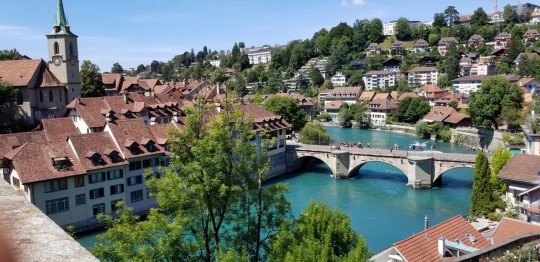
2 notes
·
View notes
Text
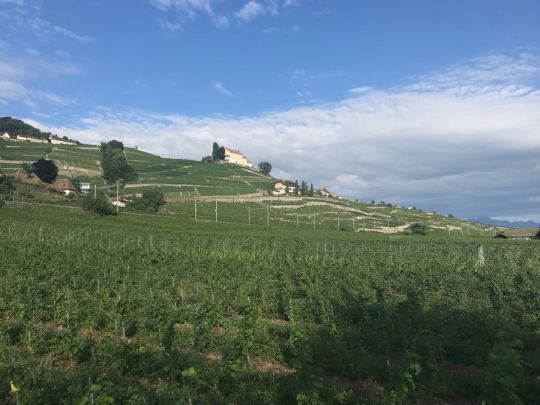
This summer was a fantastic summer!
Thanks to the ThinkSwiss Research Scholarship, I had the opportunity to spend two months in Lausanne, the beautiful city in Europe, at EPFL, one of the best universities in Switzerland and the world.
My major in Material and Nano Science is multidisciplinary and combines the knowledge of math, physics, chemistry and biology. Back at my home university, I have spent lots of time doing experiments in wet labs, where I found my interest in computational modeling. And this summer I came in touch with a computer lab for the first time. I was really excited! At the EPFL, I worked in Dr. Matteo’s Laboratory for Biomolecular Modeling, where people aim to understand the physical and chemical properties of complex biological systems by integrating computational tools and experimental data. This summer, my job was writing the scripts to analyze the conformation transition of simulated protein. At first, I was a little worried since this is something brand new to me. I had to learn Linux operational system, the VMD… … But the people in the lab were really friendly and supportive. I gained a lot in these two months. This experience provided me with the opportunity to experience research life in a computer lab, confirming my prospective future in graduate school.
Besides academic learning, I also spent most of my free time traveling around Switzerland with friends. Switzerland is divided into four linguistic regions; I have visited two of them, the French speaking and German speaking regions. Each regions feels different. Bern, Basel, Geneva are the cities I enjoyed. Hiking is the most popular activity for the Swiss. We went hiking in the Alps and Creux de Van. Although I felt really tired after hiking, the view, the beautiful nature is worth the efforts. Switzerland is truly a breathtaking country, and the people showed me a completely different lifestyle from China or North America. They work hard and enjoy themselves after work. What surprised me: It’s the first time that I saw people swimming and paddling in a lake or climbing steep cliffs.
When I arrived at the Planète Bleue, where all the students first met each other, I got a little nervous because this is the first time I came to Europe and got in touch with European people. But it went really well. Different cultures provide us with tons of topics to talk about. It’s really amazing to find out that almost all the students are from different countries, and every little single thing is treated so differently. I made some really great friends here, and I’ll be really sad to separate from them after this program. I hope I can see them in the future.
I am really grateful I got this fabulous opportunity to go to EPFL, to Switzerland. Academically, I came in touch with a new field and learned a lot. In life, I had a wonderful time traveling around Switzerland and met friends from all over the world. Above all, I sincerely recommend students to apply for this program. You won’t be disappointed!
Yifan Yang
0 notes
Text
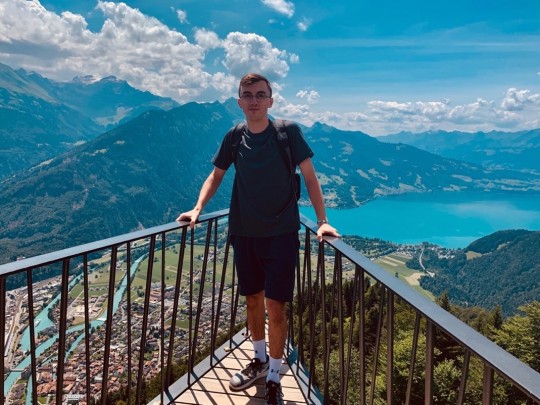
This past summer I was fortunate enough to have been awarded a ThinkSwiss Research Scholarship from the Embassy of Switzerland in the United States to conduct research at the University Hospital Zürich (USZ) Brain Tumor Center. There I worked in the Departments of Neurology and Neurosurgery under the direction of Drs. Dorothee Gramatzki and Michael Weller, world-leaders in the clinical study of neuro-oncology and colleagues of my US mentors, Drs. Terri Armstrong and Mark Gilbert of the National Institutes of Health (NIH) Neuro-Oncology Branch. My project focused on the role of antidepressant drugs among a cohort of glioblastoma, an aggressive and infiltrative brain neoplasm, patients from the Canton of Zürich. From this work, I was able to present my findings to the laboratory staff in PowerPoint form and compile a first-authored manuscript which I will submit for publication in the Journal of Neuro-Oncology.
USZ was a unique institution to conduct clinical investigation at because of the multidisciplinary and highly collaborative culture there. Additionally, the USZ Brain Tumor Center consists of expert clinical neuro-oncologists, neurosurgeons, neuroradiologists, and radiation oncologists which allowed me to gain research knowledge as well as clinical exposure in a variety of relevant fields. During my 9 weeks in Switzerland, I was able to shadow in the neuro-oncology clinic and neurosurgical operating room to better understand the clinical care brain tumor patients receive at USZ.
Outside of the hospital, I was able to enjoy all that Zürich and Switzerland have to offer. From the Limmat River to Grossmünster, Zürich is a breathtaking European city with a rich history and culture which I was able to appreciate during my time abroad. Also, Zürich Hauptbahnhof, the largest railway station in Switzerland and a major tourist hub, is centrally located and allowed me to easily travel all over Switzerland, Germany, and Liechtenstein. From Geneva to Lugano and Vaduz to Munich I was constantly blown away by the beautiful European landscapes and architecture as well as the picturesque views. Personally, my most memorable trip, which I would recommend to all future ThinkSwiss awardees, was to Interlaken, Switzerland (pictured). This resort town is located in the mountainous Bernese Oberland region of central Switzerland. Interlaken can be found in a valley, between the emerald-colored waters of Lake Thun and Lake Brienz which I was able to view during my 4,500-foot paragliding drop from Beatenberg. Finally, I was incredibly grateful to have spent 2 days with my fellow ThinkSwiss awardees in Bern, Lucerne, and Engelberg during which we dined on the Reuss and summitted the 10,623-foot Mount Titlis.
James Rogers
0 notes
Text
2019 Climate Change Research Summer School at the University of Bern
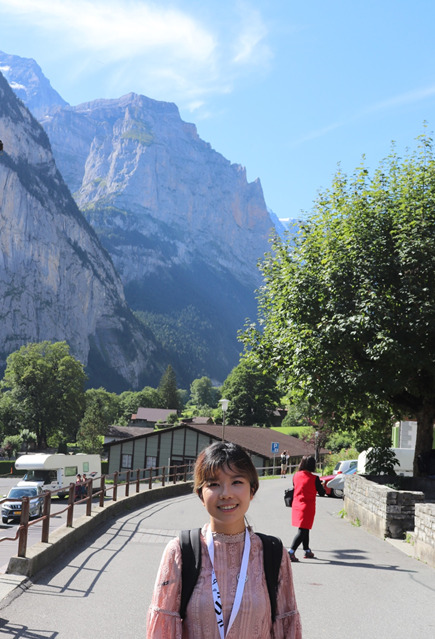
The 2019 Climate Change Research Summer School at the University of Bern, generously funded by the ThinkSwiss scholarship program, was inarguably the highlight of this summer. Upon my arrival to Switzerland, I was overwhelmed by the textbook examples of various landscapes and the beautifully conserved Swiss heritage - but the experience I would have for the following two weeks was much more than feeling like a protagonist of Heidi.
As a student in global health, recognizing the current state of intergovernmental efforts to protect the vulnerable populations against diseases due to climate change is important. From a broader perspective, this also means that knowing what each government has to say about climate change matters. As a hub of intergovernmental institutions, Switzerland was a perfect destination to meet and build connections with those who were engaged in such conversations. In fact, I was able to attend keynote lectures taught by the most renowned professionals on climate change, including Professor Thomas Stocker, a former co-chairman of one of the working groups of the Intergovernmental Panel on Climate Change, and Professor Peter Van den Bossche, the Director of Studies of the World Trade Institute. I was in awe of the obstacles they had to face to convince the decision makers of the severity and consequences of climate change but pitied the reality that the optimal economic and environmental solutions to climate change would not be met due to the conflicts of interests.
The hands-on activities taught via workshops were also extremely insightful, and they provided me with skills applicable to other fields of research. As a part of one of the ten workshops, I analyzed the discourse network of two administrations surrounding an important issue surrounding the climate change crisis. My task was to compare and contrast the discourse network of Trump and Obama administration surrounding the Paris Agreement; Obama signed the Paris Agreement, and Trump withdrew from it. By analyzing the density of the connections we had between the actors and concepts, the distance between the concepts, and so on, we were able to observe what actors and concepts about the Paris Agreement were shifting the dynamics of the discourse. I thank the summer school for enrolling me into this workshop, as I see these skills valuable for any research recognizing individuals and concepts playing a pivotal role in a topic of interest.
Finally, the one-day excursion to Jungfraujoch! This was certainly the most memorable experience of the summer school. We were able to observe the devastating effects of climate change and global warming at the tip of Europe, as well as the state-of-art technology to measure the pollutants, greenhouse gases, and temperatures in their most uninterfered state from urbanization. The researchers, who have stayed in the research station for many years, told us about the sudden and drastic changes in climate - they do not need to clean the roads every morning anymore due to the lack of snow, and the Alps occasionally surprises them with night rain showers, which is unheard of and should not be heard of. I felt a great weight on my shoulders to be more cautious about the byproducts of our consumption, not only to preserve this overwhelming beauty of nature, but also to prevent the butterfly effect of a single temperature rise on the local ecosystem and us.
I strongly encourage anyone who has an interest to learn more about climate change to apply to the Climate Change Research Summer School at the University of Bern. You will learn that climate change mitigation is much more urgent than you think, and that your involvement to this great cause would impact the globe in a deeper way than you think. Moreover, you will make lifelong friends who are always there to share brilliant ideas to change the world!
Suehyun Cho
0 notes
Photo
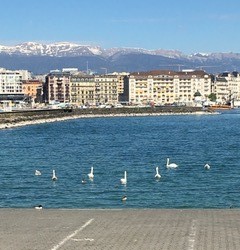
I’m a PhD student writing my dissertation on global health governance. This fall, the ThinkSwiss Scholarship funded my research stay at the Graduate Institute of Geneva Global Health Center, where I worked with Dr. Ilona Kickbusch and Dr. Suerie Moon. This was my third research trip to Geneva, and I’m so glad I had the opportunity to go back! From an academic perspective, there’s no better place in the world to be. Geneva has an incredible community of academics, policymakers, and practitioners. For the most part, I’ve found everyone to be really accessible, whether I’m asking to interview them for my research or just to grab coffee and chat about their work. The Graduate Institute itself is a particularly wonderful resource. Whereas a political science department in the US might have one or two faculty members who work on global governance and related topics, the Graduate Institute has four whole departments/centers. The school is also constantly hosting talks by visiting professors, UN officials, diplomats and other experts, which are a valuable opportunity to meet people and pick up ideas.
From a personal perspective, I’ve fallen in love with the city. Though Geneva is small, it’s very dense, diverse, and cosmopolitan. There are all kinds of restaurants, shopping, music & film festivals, etc. My favorite annual event might be the Rally du Chocolat (basically, a walking tour of chocolate shops). It’s also absolutely gorgeous, so I love to just hang out by the lake or the Cathedral and take in the view. Even when I’m at the office, getting to look out window and see Mont Blanc never gets old. There’s also an amazing public transit system, so it’s easy to explore different neighborhoods or head out of town for the day. The only downside is that it is expensive, which is why I’m so grateful to the Swiss government for supporting the ThinkSwiss program!
Mara Pillinger
1 note
·
View note
Photo
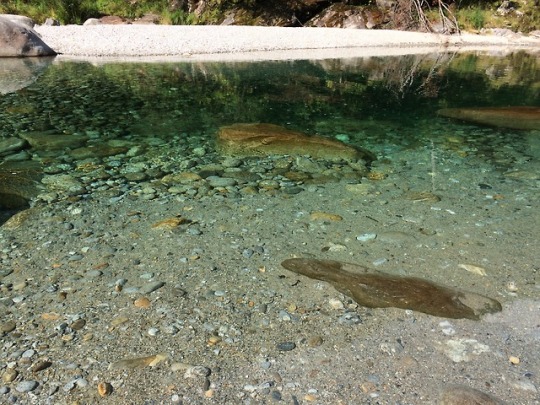
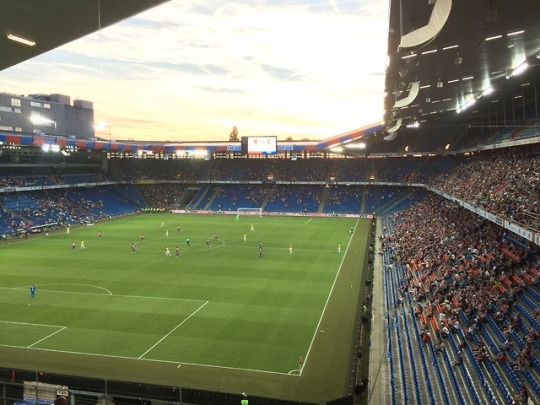
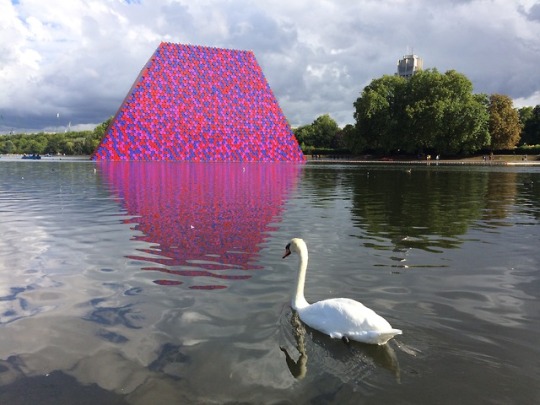
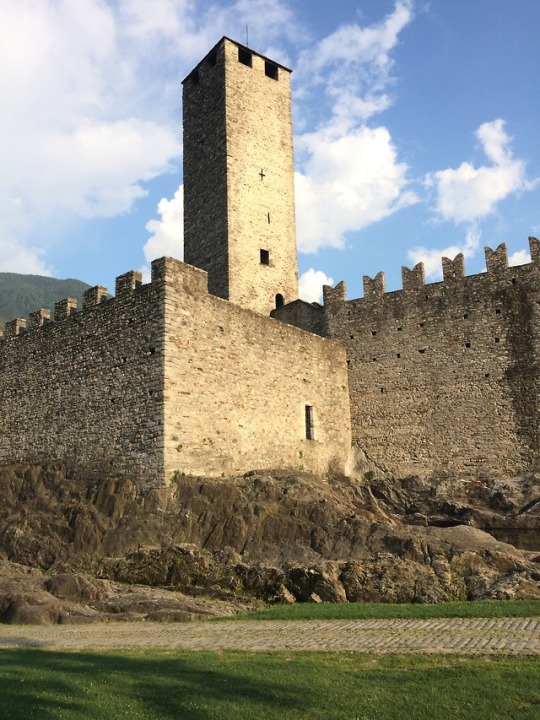
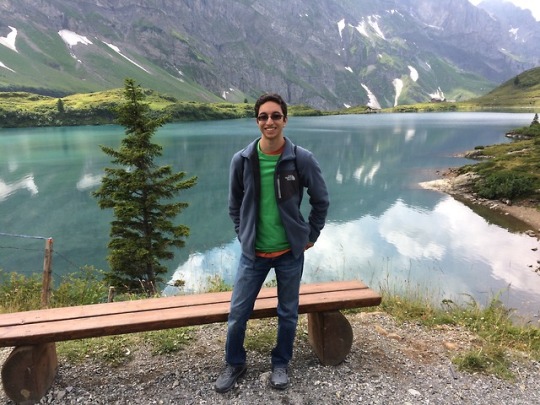
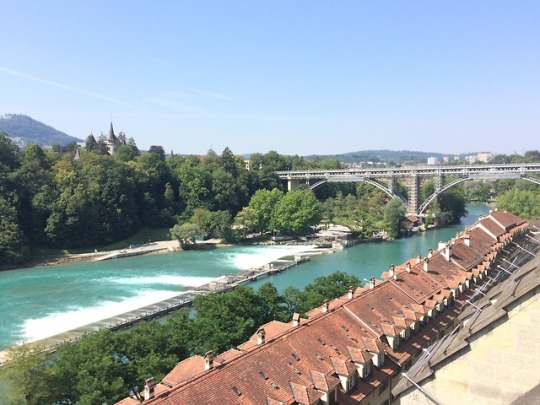
I never thought I would have the time nor resources to explore the wonderful cultures of Europe. Graduating in three years and preparing to apply to graduate school, I was busy with coursework and research in my immunology lab. When I heard about the ThinkSwiss program, however, my plans changed. Who wouldn’t travel to a beautiful country and increase research experience at the same time?
I was especially fortunate to learn that one of the former postdoctoral students in my lab at the University of Texas at Austin (UT) holds a professorial position at ETH-Zürich, in the department of Biosystems Science and Engineering (located in Basel). The research group, called the Laboratory for Systems and Synthetic Immunology (LSSI), complimented the previous research I had done at UT, so choosing ThinkSwiss was really just the next logical step.
With the generosity of the ThinkSwiss Research Scholarship, I gained valuable research experience in Basel, which is Europe’s Biotech capital. Specifically, I learned about using a mammalian display system to better engineer antibodies and other proteins. I also learned about synthetic biology and its potential to increase functionality in cell-based therapies such as Chimeric Antigen Receptor T-cells (CAR-T) and better treat cancers.
I gained access to technologies I otherwise would not have been exposed to and it further strengthened my will to go to graduate school. In fact, the conversations from colleagues of diverse disciplines at the LSSI helped me to formulate many project ideas I would like to pursue in my Ph.D.
Outside of research, I fell in love with Basel, a charming city of just over 170,000 residents, because it reminded me of my university town of Austin; the Rhine river resembled the Colorado river and the distance to downtown was not too far. Basel did, however, have some cool differences: I could swim in the Rhine with colleagues from lab or with roommates in the Alumneum, and I could cross the Rhine river and in fifteen minutes end up in Germany or France!
Almost every weekend I went to a different European city to visit relatives or explore the history and nature of the city. Long journeys were possible with the generous train tickets offered by the ThinkSwiss Research Fellowship. I enjoyed diving in the extremely clear yet ice-cold waters of Verzasca in southern Switzerland, witnessing a local soccer match in Basel, and visiting Princess Diana’s memorial in London (and the Mastaba pyramid created by Christo Claude). Other times, I explored the castles of Bellinzona and spent time with other ThinkSwiss recipients on Mount Titlis and in Bern. I also took trips with my newly made friends from the Alumneum or other ThinkSwiss students. One time we had a barbeque in Zürich. The other time, my friend helped me find my way to my apartment in the crazy maze of Venice after my phone battery died. I don’t think there was any other time in my life in which I made so many good friends at the same time.
I have experienced a great amount of personal and professional growth this summer, and I am grateful that this scholarship program provides guidance for busy students to make the bold move of researching abroad in the summer. I deeply enjoyed my 12-week stay in Basel and even though I am virtually-connected in the phone group chats of my newly-made friends, I am hopeful that I will be returning to Switzerland or Europe another time to physically pay them a visit in the near future.
Justin Mirazee
0 notes
Photo
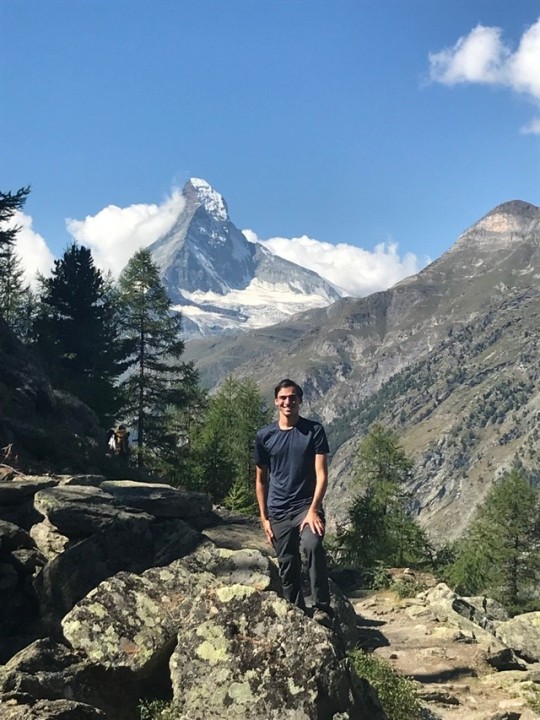
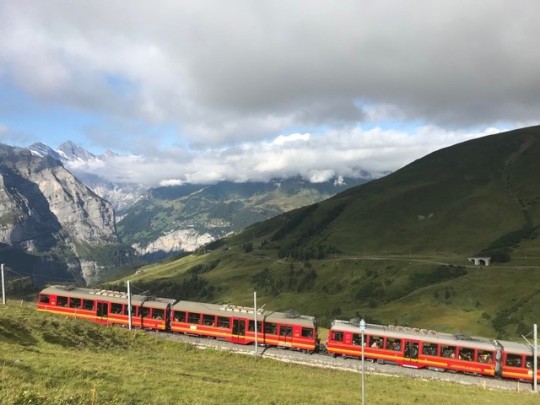
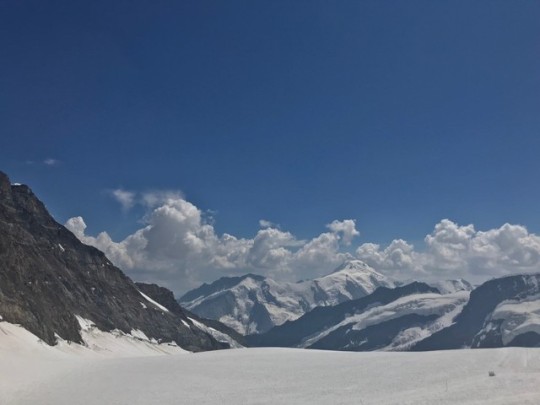
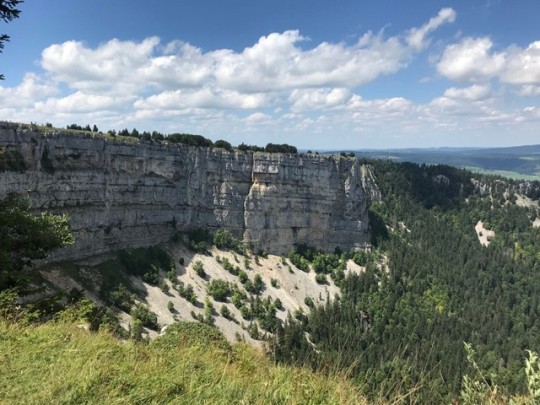
The ThinkSwiss program allowed me to experience research life at a larger university in a truly unique location. Upon coming to ETH Zürich, I was completely shocked by the magnitude of research at the university. At first, I was a bit overwhelmed, but I found my lab group to be very supportive and welcoming. Although my lab group was considered small compared to others at ETH, it was still a larger group than at my home university. I quickly found that I was able to begin working on my own research project within the lab. The research atmosphere at the university was something completely new to me. Every day, my lab group would eat lunch together and go for a coffee break. During this time, we would often have discussions about topics in biology. I believe these conversations motivated me to work harder on my project.
I found Switzerland to be an incredible country. When I originally received the grant, I had plans to make trips all around Europe: however, I learned that I did not want to leave Switzerland. It is truly a unique country with a huge array of different landscapes and environments. Every weekend I found myself traveling to a new place within Switzerland. Since Zürich is the largest city in Switzerland, it was very easy to travel to almost anywhere in the country in only a few hours. Each of the landscapes in Switzerland had their own unique feeling; however, the Jungfrau region was my favorite. The views of the alps there are absolutely amazing. It is a great experience to begin hiking towards the bottom of a trail and then gradually begin to see the landscapes below. Before coming to Switzerland I had never experienced mountains of such caliber, but now I miss them every day. This was truly an amazing experience that I will never forget.
Andrew Sommer
0 notes
Photo
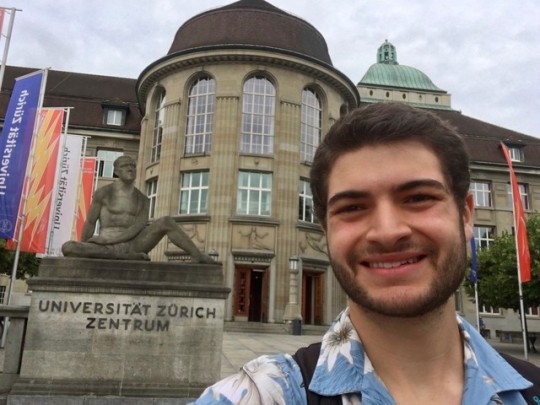
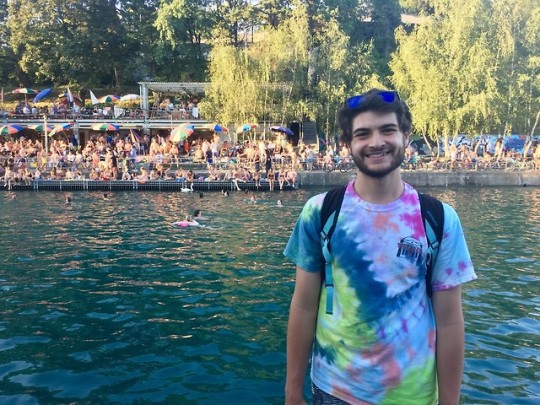
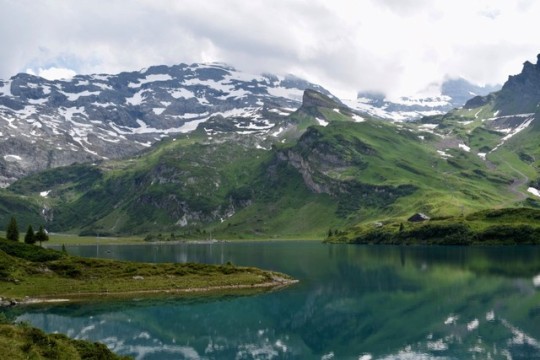
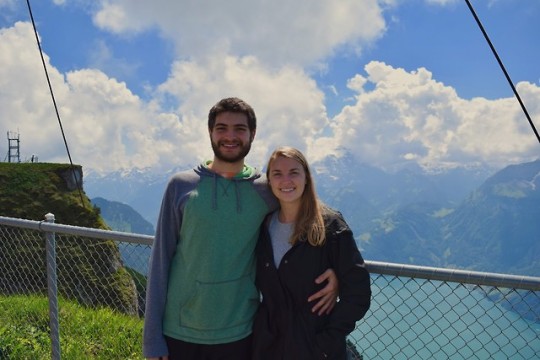
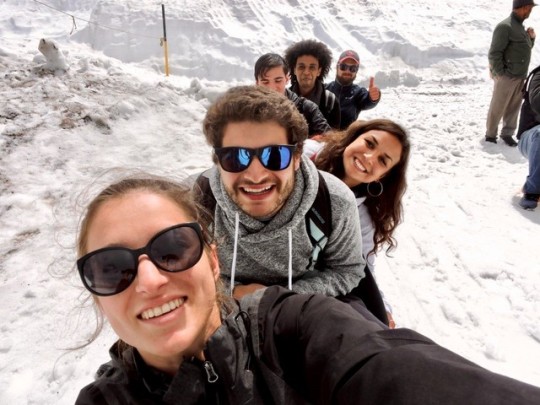
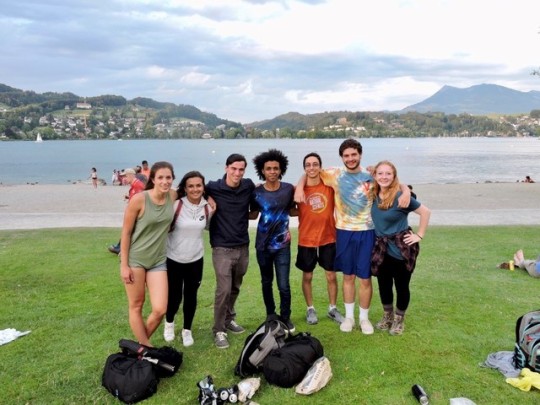
Sommer in der Schweiz
Courtesy of the ThinkSwiss Research Scholarship, I spent 12 weeks this summer in Switzerland studying computational astrophysics at the University of Zürich’s Institute for Computational Science. Because of this scholarship, I had access to the University’s facilities and faculty, which are highly respected in the astrophysics community.
I applied for and received the scholarship primarily for my research. I worked with Ph.D. students, post-doctoral researchers and faculty to study how galaxies form and evolve throughout the history of the universe using high-resolution cosmological simulations from the Feedback in Realistic Environments (FIRE) collaboration. Through the close interactions with my advisor, we crafted realistic goals for the summer, which I achieved and am now writing a paper to be submitted to a peer-reviewed journal. This experience exposed me to the daily life of research and Ph.D. students, confirming that graduate school is the next step for me, which is much more significant personally than anything else I did this summer.
Beyond my daily work, I spent much of my time enjoying the city of Zürich, exploring Switzerland and traveling throughout Europe. Zürich is a phenomenal city, with a variety of activities for all interests. My coworkers/friends and I frequented swimming in Zürichsee by the Chinagarten or in the Limmat by Dynamo (pictured), hiking Zürich’s tallest point Uetliberg or walking around Hardbrücke and Langstrasse. Outside of the city, I visited the cities of Luzern, Lugano, Bern and Basel, and hiked in Engelberg (pictured), Stoos (pictured), Lavertezzo and Arth. Each of the cities and mountain towns were wonderful, and my only regret from the summer was not spending more time in these cities plus others like Interlaken and Geneva. Switzerland truly is a breathtaking country, where you can go sledding (pictured) and swim in a public lake (pictured) in the same day in the middle of July, after eating bolognese pasta with applesauce. Beyond the country, travel to other countries was readily available by bus, train and/or plane depending on the location.
This summer was an awesome period of growth, and I encourage all prospective students to apply. My professional experiences confirmed my plan of going to graduate school and provided me with networking connections at other schools around the world. Socially, I met a wonderful collection of friends from work and from the ThinkSwiss Retreat, which every scholar should attend at all costs, after knowing zero people that were in the same continent as me when I arrived. Personally, I gained a global perspective being around individuals from so many different countries and backgrounds, and I learned how to curse in so many languages by watching the FIFA world cup matches.
Eric Rohr
2 notes
·
View notes
Photo
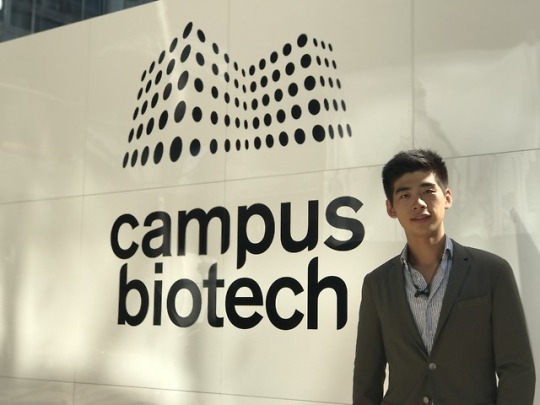
I was only nine years old when I first visited Switzerland. At that time, I was overwhelmed by what every travel guide will tell you - come to Switzerland for its grandiose landscape. However, what I didn’t realize is that however jaw-dropping Mount Titlis or Lake Geneva can be, the real beauty of Switzerland comes from its people, its schools and its cultures.
Over the summer, I worked in Campus Biotech of the Federal Institute of Technology of Switzerland (EPFL), which is right between lake Geneva and the UN. Starting from the first time I stepped into my host lab, the Defitech Chair in Brain Machine Interface (CNBI), I was immediately shocked by the incredible international backgrounds of our lab: as a lab with around 20 members, we come from over 10 different countries. Thus, every coffee break and lunch became a mesmerizing cultural experience. One day we could talk about Serbia's school system, the next day France’s music festival or Austria’s traditional cuisine. Indeed, as of 2017, over 40% of Geneva’s population is not Swiss citizens (or at least so I heard). As a result, living in Geneva, it doesn’t take long for me to feel like I truly belonged, for I know being international there is almost more of a norm than exception. Indeed, if you think about it, it is incredible how every person comes from a distinctive background, and yet in a sense we are all the same. I believe there are few cities in this world that could rival Switzerland’s cultural tolerance. And such cultural exposure is indeed a once-in-a-lifetime opportunity.
Moreover, I was also amazed by the autonomy I enjoyed in my research experience. My project was on using Brain Machine Interface to assist in the symbolic control of drones, with a specific focus on developing a classification algorithm to improve workload-level detection. And starting from day one, my advisors did a fantastic job introducing the background of the project, but they also made sure to give me great autonomy in defining the end goal, milestones and timeline of my research. Therefore, I was able to choose a research focus that best fit my background and my interests. What’s more, I also had great autonomy in choosing how to get help. In other words, there was never any supervisor for my research to keep an eye on my every progress. Instead, I was responsible for getting the help I need, actively discussing my research with other lab members for inspiration, and presenting my research to the general lab meeting. This experience really helped me to understand that, as a researcher, I need to take full ownership of my project and should always be prepared to be proactive. And I also believe that this experience has indeed helped me to hone the communication skills necessary for such a career.
Last but not least, I very much appreciated the community of the ThinkSwiss awardees. For the two-day trip we took together in Bern and Mount Titlis, I quite enjoyed learning about each other’s research and experience in Switzerland, and I felt very bonded with such a closed-knit community. Going on scooter tours, walking around Bern with beers, and chatting until 4AM over a bottle of wine, I felt I connected deeply with my fellow awardees. Indeed, we all chose to embark on an adventure to pursue knowledge in a completely foreign country, to embrace life with energy and optimism. With such a shared passion, we were really the perfect travel companions.
When I wrote down this post, two months had already passed since the conclusion of my stay in Geneva. Even tram stops that I memorized so well had begun to slip away from my memory. Nonetheless, I know that if you told me that I had to move to Geneva now, I would not hesitate, not even for a second, to call it my home one more time.
Thomas Qilong Xin
3 notes
·
View notes
Photo
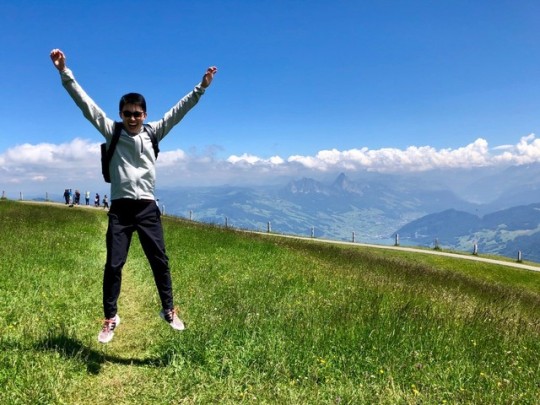
Thanks to the ThinkSwiss scholarship, I was fortunate enough to pay a second visit to Switzerland — this time, Zurich! This summer, I conducted a two-month policy research project at Center for Sustainable Finance and Private Wealth (CSP) at the University of Zurich (http://csp.uzh.ch/en.html). At CSP, I worked in a very welcoming team and collaborated with and learned from several brilliant researchers in the field of sustainable finance.
Coming from an interdisciplinary background across economics, finance, and public policy, I have always been intrigued by the role of sustainable finance (aligning the financial system and vehicles with sustainable development) in tackling the world’s challenges in climate change and more. However, as this field of study is still emerging, I have not been able to explore deeply this favorite topic of mine at the University of British Columbia, so I was eager to learn from the leading practitioner, Europe. (The European Investment Bank was the first issuer of green bonds globally.) And as one can expect from a leader in making global standards, Europe is also leading the policy and standard development in sustainable finance around better information disclosure. In 2017, the Swiss Federal Office for the Environment offered to its pension funds and insurance companies to test, on a voluntary basis, their portfolios in alignment with the 2-degree climate target; whereas member states of the European Union are pushing banking and insurance to disclose environmental and social information. During my stay at the University of Zurich, I also attended several events on this topic which convened the academia, NGOs, and government agencies. I could definitely sense the enthusiasm in discussions and presentations for rapid progress in the field. Beyond my rich academic experience, what I loved about this experience as a ThinkSwiss awardee is not only the amazingly picturesque Swiss mountains and lakes but also the trips and events organized by Presence Switzerland. Those events helped us learn about Swiss politics, policy, and culture even more and connected me with fellow brilliant awardees from diverse backgrounds. We had such a wonderful time in Lucerne and Bern! All of the above, I guess, is the reason why I still talk with my friends about my summer in Switzerland from time to time, even after two months! Bo Wang photo: Me ‘blown away’ by the breathtaking views of Swiss mountains and lakes. Taken at the top of the Rigi.
0 notes
Photo
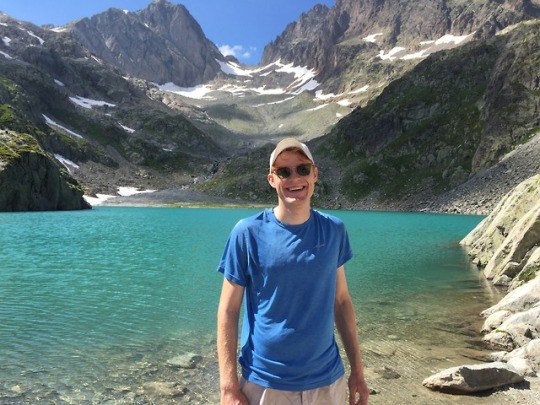
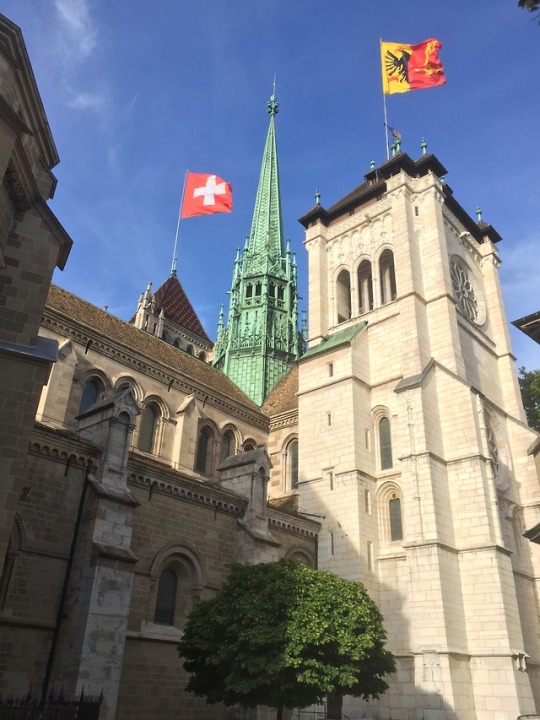
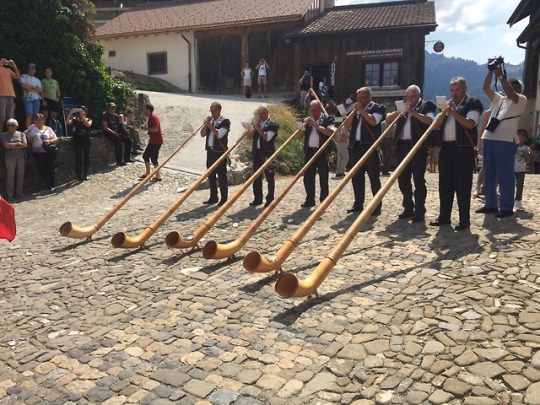
A Land of Many Cultures
I traveled to Geneva this summer hoping to get a taste of the Swiss lifestyle from one of its most famous cities. Instead, I got so much more than that. In every aspect Geneva is an international city full of different peoples, cultures, and flavors, and it offered an experience like no other city could.
Through the generosity of the ThinkSwiss Scholarship, I had the opportunity to be in Geneva in order to perform clinical research focusing on neuroimaging of the neonatal brain at the University of Geneva Pediatric Hospital. I was worried about how I would fit in a Swiss lab asI did not speak a word of French. It turned out that I need not have worried about whether I would be Swiss enough because even my lab had a wonderful international make-up. Ten different nationalities were represented among the researchers in my lab and hearing about how everyone wound up in the same neuroscience research lab from our extremely varied backgrounds was incredibly interesting. As someone who plans on going to medical school and then entering the medical field, being able to work in a European hospital and compare their health system with the American one was very illuminating. Because many of my fellow researchers were also interested in medicine, we spent many hours discussing the medical systems and educational paths in our respective home countries. These conversations with people who had experienced these health systems first hand were far more educational than anything that I could have read online. If it was not for the attractiveness of Geneva pulling top researchers and students from around the world, I never would have been able to meet such a varied group of people.
It was not just my work in Geneva that had an international flair. I am a huge soccer fan, and being in Geneva during the World Cup could not have been more fun. Some of my best memories were packing into the park at Plainpalais in order to watch the public viewing and cheer on the Swiss National Team. However, there were people from every nation there for every game to cheer on their home countries. It did not matter if it was Brazil or Croatia. Every country had people there in Geneva waving their flags. Beyond sports, one of my favorite weekends was the Fête de la Musique (Festival of Music) in Geneva. It consisted of three straight days of constant live music on public stages all around the city with genres spanning from classical to rock to Colombian folk to metal to Brazilian rap. It was an incredible celebration of world music, and it was wonderfully complemented with a rainbow of different ethnic foods. In the span of an hour, I was drinking Brazilian soda and eating a Turkish kabap while listening to Spanish salsa before heading over to dance in front of a French DJ. Before visiting Switzerland, I had an expectation of homogenous cheese and chocolate. I certainly did not expect the wonderful offering of different international cultures along with the rich Swiss one.
That is not to say that I did not get a great taste of the Swiss culture as well. I spent several of my weekends traveling around the country to catch sight of the best that the country had to offer. And boy did Switzerland have a lot to offer. I hiked in the alpine tundra in the Bernese Alps. I cooled off by taking a swim in two different UNESCO World Heritage sites in the Aare River in Bern and Lake Oeschinen in the Alps. I celebrated Swiss heritage by spending Swiss National Day in the medieval village of Gruyères. I could take a trip back in time in my own city just by walking through the old city of Geneva. From the countless afternoons sitting on the banks of Lac Leman, I know why so many people from all over the world are drawn to this city and country. It was truly an unforgettable summer. Switzerland is a country like no other, and the things that I learned and experienced there, I could never have found anywhere else.
Ben Zollinger
0 notes
Photo
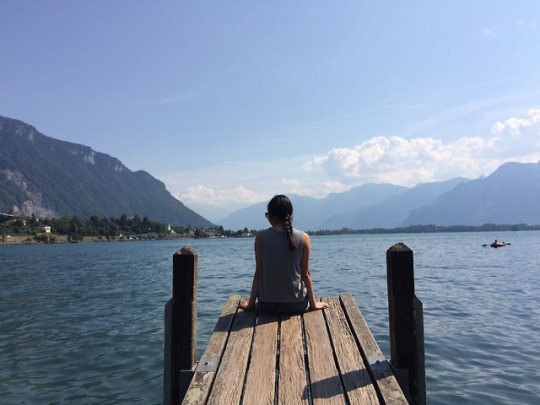
Summer Unvergraduate Research (SUR) Programme 2018 - University of Lausanne (part 4 of 4)
Although I have been involved in research for quite awhile at my undergraduate institution in the US, my research experience in Switzerland was so eye-opening and life-changing. Thanks to ThinkSwiss, I have had an amazing summer research experience in Lausanne, Switzerland at the Université de Lausanne. I had the opportunity to work with Dr. Nicolas Mermod’s lab on gene therapy for Duchenne Muscular Dystrophy. This international experience provided me with wonderful insights into scientific research and graduate school in a foreign country. Everyone at my lab welcomed me with open arms and my supervisor always provided me with good instructions so that my project can proceed smoothly. I obtained many useful lab techniques and learnt how to think critically as a scientist. I also learnt a lot from the PhD students and postdoc insightful knowledge about life in graduate school and future career in my field.
Although being busy with lab work, I made sure to enjoy my time in Switzerland by traveling most of the weekends. I made so many good memories with my friends in the summer research program. We went hikings on the beautiful Alps and observed the magnificent Matterhorn by the lake. We visited great Swiss cities such as Bern, Lucerne, Geneva, Gruyere, Montreux. The fondue and raclette were definitely a highlight of the experience and Switzerland gave me an amazing food experience with fine restaurant and wonderful chocolate and cheese. I love the memories of my friends and I walking through the historic streets, climbing to the top of the tower of old cathedrals, wandering through ancient castles, having pizza picnic by the beautiful lake, and enjoying the unlimited chocolate and cheese tasting in Gruyere. Never once did the nature and culture of Switzerland cease to amaze me!
Uyen Pham
1 note
·
View note
Photo
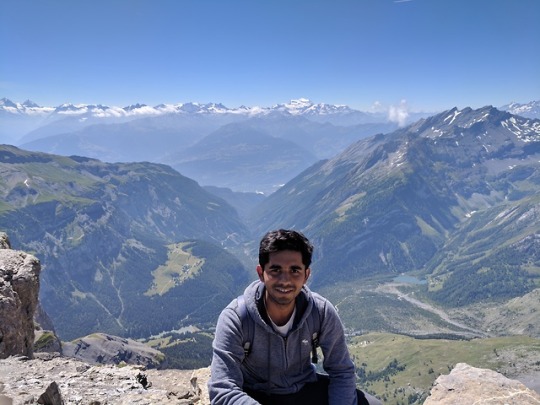
Summer Unvergraduate Research (SUR) Programme 2018 - University of Lausanne (part 3 of 4)
From soaring mountains to pristine lakes, Switzerland has it all – and this summer, I was fortunate enough to experience all of this while completing a research program at the University of Lausanne.
I worked for two months at the Laboratory for Research in Neuroimaging under the supervision of Dr. Bogdan Draganksi. I could not have asked for a better experience, or a more supportive mentor. I had been involved in neuroscience research for a few years prior to this program, but I had never explored neuroimaging and this research program gave me the perfect opportunity to learn more about this field.
Under Dr. Draganski’s able guidance, I was soon analyzing MRI scans of Parkinson patients. I loved the work and the experience has definitely inspired me to explore neuroimaging further. Each week, I learned more and more about neuroimaging while on the weekends, I was able to enjoy all that Switzerland has to offer. From Bern to Interlaken, and Lugano to Chur, my fellow program participants and I tried to explore as much as we could (with frequent chocolate stops!).
But beyond the incredible education and views, I also learned a lot about the Swiss way of life. This is evident in even the smallest things. For instance, I found it a complete surprise that very few stores are open on Sunday to allow for a day to rest and recover. It is a wonderful concept that allows residents to relax and spend time with friends and family, away from the bustle of daily life.
Coming back from Switzerland, I can say that it has really been the experience of a lifetime and I definitely plan on coming back whenever I can. I will always treasure the friends and memories that I have made on this trip.
Ramana Trivedi
0 notes
Photo
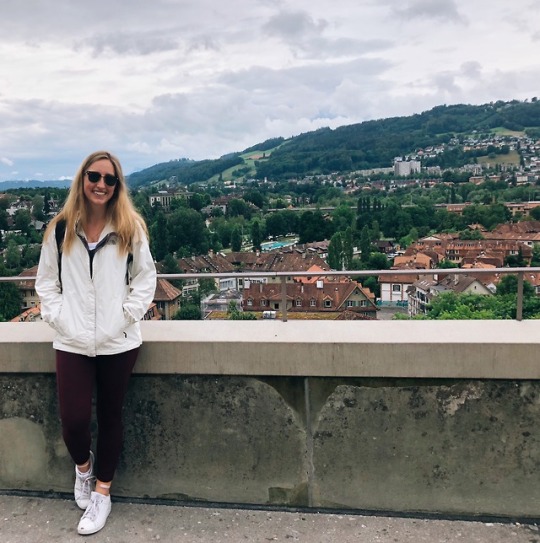
Summer Unvergraduate Research (SUR) Programme 2018 - University of Lausanne (part 2 of 4)
Throughout my past two years of university, I have become fairly accustomed to hearing students returning from a semester abroad saying that it “changed their life” or that they’re “not the same person” that they were when they left the US just a few months earlier. If I’m being honest, I never really believed it. How could just a few months, albeit in a new location, be so incredibly and deeply impactful? As I sit here now, just days away from the end of my time participating in the Summer Undergraduate Research programme at the Univeristé de Lausanne, I have come to understand exactly what those students were saying, and even how much of what they said may have been an understatement.
Through the SUR programme and as a student sponsored by ThinkSwiss, I have experienced a level of professional and academic growth completely unprecedented in my life. I had the privilege of working in Prof. Fabio Martinon’s lab in the Department of Biochemistry for two months, studying cellular inflammation pathways. Aside from discovering a passion for a topic that I may never have encountered otherwise, I was able to fully immerse myself in the research while working amongst so many incredibly intelligent and inspiring students and faculty. This meant learning to work through the frustration of being new, making the mistakes, and asking a lot of questions, to ultimately reach a point where I felt I could communicate my work effectively and truly contribute to the lab. I leave now with a newfound feeling of confidence and the tools to navigate a professional environment, no matter how different or challenging it may be.
Arguably more important than this, however, is the personal growth I experienced during my time in Switzerland. It has impacted all areas of my life in the best ways. Being taken out of my comfort zone taught me independence and how to take initiative. Working within a culture that values community and finding pleasure in everything you do taught me how to recognize when it’s time to take a step back and appreciate where I’m at. Being surrounded by so many different cultures, from both within and outside of the program, taught me perspective and showed me an incredible breadth of new and unique world-views. For each of these lessons, I have only the SUR programme and ThinkSwiss to thank.
Not to mention that this was all in such a breathtaking country – in just two short months, I was able to see mimes perform in Gruyères, the World Cup final in Geneva, the annual Folklore Festival in Zermatt, the glacier waterfalls in Lauterbrunnen, and so many more magnificent sights that even the 1,500-plus pictures I took couldn’t fully capture.
Looking back on my time here, I wholeheartedly believe that I am not the same person that I was when I left two months ago. Much like that of the students I was so skeptical of not so long ago, my life has changed in the best of ways, and I will be forever grateful to ThinkSwiss for facilitating this opportunity for students like myself in a country that words cannot even begin to describe. Switzerland will always hold a special place in my heart and I leave with a bittersweet feeling, knowing I’ll miss so much of what made this summer great, but eager to take what I’ve learned and continue to build on it for years to come.
Abbey Reinhart
0 notes
Photo
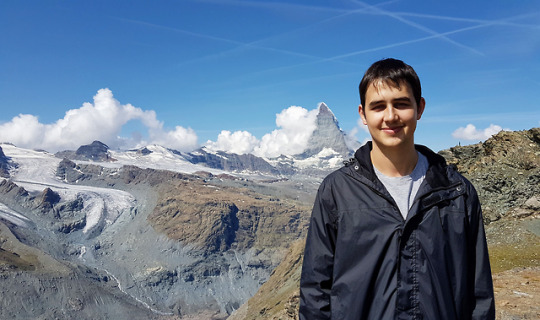
Summer Unvergraduate Research (SUR) Programme 2018 - University of Lausanne (part 1 of 4)
As I stood at the top of Gornergrat, with the Matterhorn behind me and my new friends in front of me, I could not help but reflect on the opportunity that I had been given as a ThinkSwiss Travel Grant Recipient and a SUR Programme scholar. All of those 5 am wakeups to catch a supersaver train ticket were worth it because I had the chance to see so much of Switzerland and made many strong friendships along the way.
During my stay, I had the chance to work in the lab of Dr. Vladimir Katanaev under the supervision of Holly Shaw, a PhD candidate, on a project investigating post-translational modifications of the Frizzled Receptor to add to the body of knowledge for the development of future triple negative breast cancer therapeutics. The lab was very welcoming and made me feel right at home, with the weekly lab meetings, daily group lunches and frequent aperos. I was impressed by the expertise, work ethic and diversity of our lab members and overjoyed to learn new words in French, Spanish, Russian, and German on a daily basis! The resources available to me, new techniques I learned and progress that I made on my project made my two months productive, enjoyable and was certainly helpful for my future career in science.
There were so many highlights to my trip: traversing through a herd of cows that were blocking our hiking trail near Lac Chavonnes, getting soaked by the famous Jet d'Eau in Geneva, sliding down snow-covered hills on Glacier3000, afternoon Gelato in Lugano, falling asleep on the beach of Stein am Rhine, exploring the waterfalls of Lauterbrunnen in the pouring rain, volleyball after work and night-time swims to name a few! And with me were intelligent, curious and adventurous friends that kept me on my feet and always made sure I had a good time. What more could I have asked for? Every day was filled with new challenges, sights and learning opportunities and my only regret is that I did not get a chance to stay longer!
Thank you ThinkSwiss, my mentor and the SUR Programme for helping me make this Swiss dream a reality!
Mihai Dumbrava
0 notes